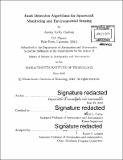Fault detection algorithms for spacecraft monitoring and environmental sensing
Author(s)
Carlton, Ashley Kelly
DownloadFull printable version (13.39Mb)
Other Contributors
Massachusetts Institute of Technology. Department of Aeronautics and Astronautics.
Advisor
Kerri L. Cahoy.
Terms of use
Metadata
Show full item recordAbstract
Constellations of hundreds of low-Earth orbiting small satellites are currently being designed and built. Operators plan to provide data and media distribution services as well as imaging and weather observations. As our society increases its dependence on satellite services for communication and navigation, there is a growing need for efficient spacecraft systems monitoring and space situational awareness to avoid service interruptions due to hazards such as space weather. Particularly for large constellations, satellites need greater autonomy to improve responsivity and reduce the load on human operators. In this thesis, we present the development of algorithms that identify unusual behavior in satellite health telemetry. Once these events have been identified, we collect and analyze them, along with assessing space weather observations and operational environment factors. Our approach uses transient event detection and change-point event detection techniques, statistically evaluating the telemetry stream compared to a local norm. This approach allows us to apply our algorithms to any spacecraft platform, since there is no reliance on satellite- or component-specific parameters, and it does not require a priori knowledge about the data distribution. We apply these techniques to individual telemetry data streams on geostationary Earth orbit (GEO) communications satellites (ComSats), and consider the results, a compiled list of unusual events for each satellite. Results include being able to identify events that affect many telemetry streams at once, indicative of a spacecraft system-level event. With data from multiple satellites, we can use these methods to better determine whether external factors played a role. We compare event dates to known operational activities and to known space weather events to assess the use of event detection algorithms for spacecraft monitoring and for environmental sensing.
Description
Thesis: S.M., Massachusetts Institute of Technology, Department of Aeronautics and Astronautics, 2016. Cataloged from PDF version of thesis. Includes bibliographical references (pages 103-116).
Date issued
2016Department
Massachusetts Institute of Technology. Department of Aeronautics and AstronauticsPublisher
Massachusetts Institute of Technology
Keywords
Aeronautics and Astronautics.